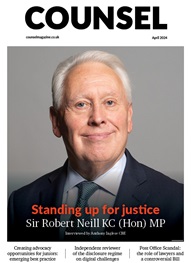*/
Court fees for child care proceedings could be abolished, following a recommendation in the Lord Laming report on child protection.
The report, commissioned by Children’s Secretary Ed Balls MP in the wake of the Baby P tragedy, makes 58 recommendations for change, including abolishing the court fees for child care cases—which rose 3,000% in May 2008—from 2010/11.
It warns there has been an “over-emphasis on process and targets” rather than tackling risks, which has caused social workers to lose confidence.
Desmond Browne QC, Chairman of the Bar, commented: “The Bar Council has consistently warned about the effect of the enormous rise in court fees...on local authorities’ ability to initiate child care proceedings. It was inevitable that an increase from £150 to £4,825 for a fully contested matter would deter some authorities from acting.”
Justice Secretary Jack Straw has appointed Francis Plowden, a member of the Judicial Appointments Commission, to lead an independent review into court fees in public law cases to assess whether they do act as a deterrent in commencing care proceedings.
“If there is evidence that they are a barrier for local authorities when deciding whether to proceed with a care order for a vulnerable child, we will abolish them,” said Ed Balls.
The report, commissioned by Children’s Secretary Ed Balls MP in the wake of the Baby P tragedy, makes 58 recommendations for change, including abolishing the court fees for child care cases—which rose 3,000% in May 2008—from 2010/11.
It warns there has been an “over-emphasis on process and targets” rather than tackling risks, which has caused social workers to lose confidence.
Desmond Browne QC, Chairman of the Bar, commented: “The Bar Council has consistently warned about the effect of the enormous rise in court fees...on local authorities’ ability to initiate child care proceedings. It was inevitable that an increase from £150 to £4,825 for a fully contested matter would deter some authorities from acting.”
Justice Secretary Jack Straw has appointed Francis Plowden, a member of the Judicial Appointments Commission, to lead an independent review into court fees in public law cases to assess whether they do act as a deterrent in commencing care proceedings.
“If there is evidence that they are a barrier for local authorities when deciding whether to proceed with a care order for a vulnerable child, we will abolish them,” said Ed Balls.
Court fees for child care proceedings could be abolished, following a recommendation in the Lord Laming report on child protection.


Sam Townend KC explains the Bar Council’s efforts towards ensuring a bright future for the profession
Giovanni D’Avola explores the issue of over-citation of unreported cases and the ‘added value’ elements of a law report
Louise Crush explores the key points and opportunities for tax efficiency
Westgate Wealth Management Ltd is a Partner Practice of FTSE 100 company St. James’s Place – one of the top UK Wealth Management firms. We offer a holistic service of distinct quality, integrity, and excellence with the aim to build a professional and valuable relationship with our clients, helping to provide them with security now, prosperity in the future and the highest standard of service in all of our dealings.
Is now the time to review your financial position, having reached a career milestone? asks Louise Crush
If you were to host a dinner party with 10 guests, and you asked them to explain what financial planning is and how it differs to financial advice, you’d receive 10 different answers. The variety of answers highlights the ongoing need to clarify and promote the value of financial planning.
Most of us like to think we would risk our career in order to meet our ethical obligations, so why have so many lawyers failed to hold the line? asks Flora Page
If your current practice environment is bringing you down, seek a new one. However daunting the change, it will be worth it, says Anon Barrister
Creating advocacy opportunities for juniors is now the expectation but not always easy to put into effect. Tom Mitcheson KC distils developing best practice from the Patents Court initiative already bearing fruit
Sam Townend KC explains the Bar Council’s efforts towards ensuring a bright future for the profession
The long-running fee-paid judicial pensions saga continues. The current cut-off date for giving notice of election to join FPJPS is 31 March 2024, and that date now gives rise to a serious problem, warns HH John Platt